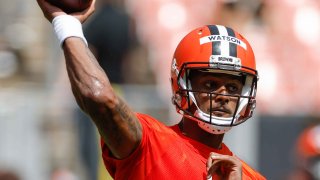
Deshaun Watson’s disciplinary hearing concluded Thursday with the NFL adamant about an indefinite suspension of at least one year and the quarterback’s legal team arguing there’s no basis for that punishment, two people with knowledge of the case told The Associated Press.
Both sides presented their arguments over three days before former U.S. District Judge Sue Robinson in Delaware, according to both people who spoke on condition of anonymity because the hearing isn’t public.
Watson was accused of sexual misconduct by 24 women and settled 20 of the civil lawsuits.
Robinson, who was jointly appointed by the league and the NFL Players’ Association, will determine whether Watson violated the NFL’s personal conduct policy and whether to impose discipline.
Post-hearing briefs are due the week of July 11 so it’s uncertain when Robinson will make a ruling. The Cleveland Browns are hoping to know Watson’s availability before training camp starts July 27.
If either the union or league appeals Robinson’s decision, NFL Commissioner Roger Goodell or his designee “will issue a written decision that will constitute full, final and complete disposition of the dispute,” per terms of Article 46 in the collective bargaining agreement.
A person familiar with the case told the AP the league believes it presented evidence to warrant keeping Watson off the field this season. The person said the league’s investigation determined Watson committed multiple violations of the personal conduct policy and he would be required to undergo counseling before returning.
Sports
Patriots, Red Sox, Bruins, Celtics and more
A person familiar with Watson’s defense told the AP they expect a suspension. Asked what would be acceptable, the person said: “our goal is to get him back on the field this year.”
Two separate Texas grand juries declined to indict Watson on criminal complaints stemming from the allegations.
Watson has denied any wrongdoing and vowed to clear his name.
This is the first hearing for Robinson, who was the first female Chief Judge for the District of Delaware. Previously, Goodell had the authority to impose discipline for violations of the personal conduct policy.



